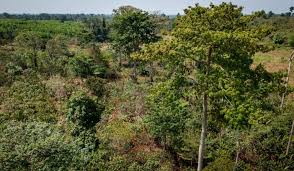Nigeria’s largest national park, the Gashaka Gumti Forest in Taraba and Adamawa States, has gained global recognition after its carbon project was picked as one of the first beneficiaries of the UK-backed Carbon Accelerator Programme for the Environment (CAPE). The announcement, made on Tuesday, marks a big step for Nigeria in advancing nature-based climate solutions.
The Gashaka Gumti Carbon Project was selected from over 100 applications submitted by organisations in 28 African countries. It is one of only four projects chosen in the first batch to benefit from feasibility and development support under CAPE. Organisers said the initiative is designed to mobilise investment into projects that can cut carbon emissions, improve biodiversity, support carbon sequestration, and provide better livelihoods for local communities.
The Gashaka Gumti initiative will focus on restoring degraded parts of the park, which is not only Nigeria’s largest national park but also one of the most important biodiversity hotspots in West Africa. The forest is home to endangered species such as chimpanzees, elephants, and rare birds, and plays a critical role in carbon storage.
Other projects selected include Kenya’s Papariko Mangroves, which will restore mangrove forests along the southeastern coast; Tanzania’s Rubeho Mountains Carbon Project, which will work with local communities to protect and restore forests in the Eastern Arc Mountains; and Zambia’s Barotse Rangelands for Restoration, which aims to combine rangeland rehabilitation with livestock productivity improvements.
According to CAPE, the projects were evaluated based on their development stage, social and environmental impact, potential for scaling, and alignment with the needs of carbon buyers and investors. The programme prioritised projects that could deliver both community benefits and environmental protection.
CAPE was launched in November 2024 and is funded by FSD Africa, a UK financial sector development agency, in partnership with the African Natural Capital Alliance and Finance Earth, an international environmental impact adviser and investor. The programme was created to address the chronic shortage of early-stage financing for nature-based carbon projects across Africa.
Nature-based solutions such as forest regeneration, mangrove restoration, and rangeland management are becoming widely accepted as key tools in the fight against climate change. However, many such projects fail to move beyond planning due to a lack of upfront capital. CAPE provides recoverable grants and advisory services to help projects become investment-ready and attract both public and private capital.
Reshma Shah, the Carbon Markets Lead at FSD Africa, said the programme was designed to unlock Africa’s huge potential in the global carbon market. She explained that CAPE’s goal is not just about generating carbon credits but also about creating fair and inclusive growth models for African communities.
“CAPE shows that Africa’s natural capital is not just a solution to the climate crisis but a catalyst for tackling interconnected challenges while unlocking fair and inclusive growth. These projects go beyond generating carbon credits; they are blueprints for redefining how the world invests in and values nature,” Shah stated.
For Nigeria, the Gashaka Gumti project is expected to bring several benefits. It will help restore degraded ecosystems, sequester millions of tonnes of carbon, protect endangered wildlife, and create job opportunities for surrounding communities. The project is also expected to attract fresh investment into Nigeria’s green economy and boost the country’s role in Africa’s transition to sustainable development.
Analysts believe the success of CAPE’s pilot projects could set a new standard for climate financing in Africa. If scaled properly, the programme could draw billions of dollars in new investment into Africa’s carbon markets, which could help narrow the global biodiversity funding gap estimated between $598 billion and $824 billion annually.
The selection of Gashaka Gumti into CAPE’s first group of projects highlights both the urgency of climate action and Africa’s ability to shape the future of environmental protection. For Nigeria, it represents not just a win for biodiversity but also a signal that its natural capital can play a central role in building sustainable growth for the future.
